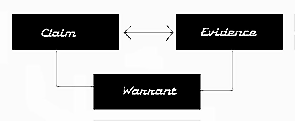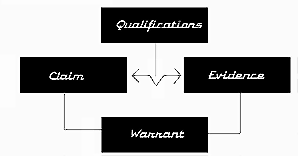After you have constructed a thesis statement, you will need to present evidence in support of that thesis. In fact, while your thesis is the heart of your paper, most of your essay will be devoted to supporting that thesis with evidence. Supporting evidence for an argument generally involves four elements.
1. The Claim -- What you want your readers to believe
2. The Evidence -- What you will use to support the claim
3. The Warrant -- A general principle that explains why you think your evidence is relevant to your claim
4. Qualifications -- Those acknowledgements which make your claim and evidence more precise
How do these elements fit together? Let's look at the relationship of the individual elements before proceeding to join them altogether.
You must always state both your claim and your supporting evidence explicitly; one without the other is either pointless evidence or an ungrounded opinion. Taking a fairly straightforward example:
"I know it rained last night (claim) because the streets are wet (evidence)."
![]()
| It rained last night | the streets are wet |
It would be difficult to take issue with this claim-evidence relationship.
But most evidence-claim relationships are not so simple. They require two further elements: a warrant and qualifications. A warrant is a general principal that serves as a bridge between your claim and your evidence -- it explains how your evidence is both accurate and relevant to your claim. If one claims, say, "The emancipation of Russian peasants was merely symbolic (claim) because it didn't improve the material conditions of their daily lives (evidence)," the reader might ask:
"Even if I grant that your evidence regarding the quality of life for Russian peasants did not improve, why should that lead me to believe your claim that their emancipation was merely symbolic?"
This questions underscores that even if both your claim and your evidence are entirely accurate, it is possible to make a weak argument. You must explain why the evidence you are presenting supports the claim you are making; you must establish a warrant between your claim and your evidence

In this example, the warrant might be:
"Whenever a political action fails to improve the lives of those it is alleged to help, we judge that reform to have been only symbolic."
Qualifications limit the certainty of your conclusions, address your readers' potential objections, and project the impression of a careful writer. By recognizing objections through the use of qualifications, your writing confronts issues that might interrupt the movement between your evidence and your claim.

Qualifications to the claim used above regarding Russian peasants might include limited aspects of peasants' material lives that did improve, but were perhaps not related to their emancipation.
One good way (but certainly not the ONLY way) to develop your paragraphs that present evidence is to adopt this three part system:
CLAIM State clearly the point you are making and its relation to
your thesis. DO NOT LET YOUR EVIDENCE SPEAK FOR YOU. You must make
the point yourself and in your own language.
EVIDENCE In the evidence portion of providing evidence, you give the reader the quotation, fact, statistic or the like that illustrates your point.
WARRANT You must interpret the evidence for the reader in such a way that you make explicit HOW the evidence you provided makes your point and supports your thesis. Evidence can not stand on its own. Do not leave quotations or evidence undigested by your analysis.
Here's an example of this particular way to organize a paragraph:
Ghandi sees modern civilization as a threat to the Indian people because it promotes an endless cycle of selfish want. (claim) He says, "The railways, machineries and the corresponding increase of indulgent habits are the true badges of slavery of the Indian people." (evidence) He sees such modern technologies as the railway and machines as enslaving because they require money and labor to build, solely so that such things might exist. In Ghandi's mind, such things are not only unnecessary, they are unhelpful to a people. Happiness, he asserts, is largely a mental condition. As such, it is unnecessary to acquire material goods. (warrant)
Notice that the warrant section in the paragraph above does NOT merely assert that the evidence proves the claim. ("This quotation proves my point..."); rather, the warrant carefully demonstrates HOW and WHY the quotation illustrates the claim.